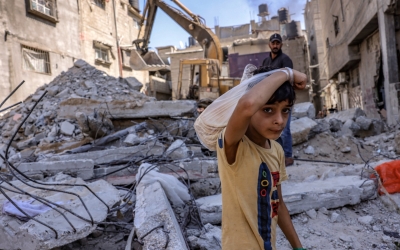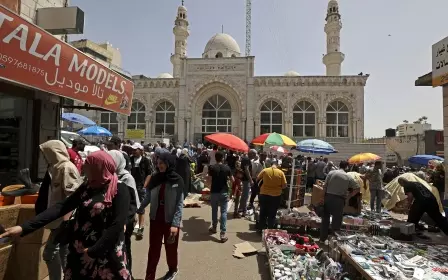Gaza's food crisis worsens as Ukraine war hits blockaded economy hard
"You see this loaf?" Abu Ahmed al-Madhoun asked as he held a bundle of bread at the Alailat bakery in the al-Nasr neighbourhood northwest of Gaza City.
"It used to be double this size a few months ago. Today, not only is it smaller but also more expensive," the Palestinian father of five told Middle East Eye in dismay.
Madhoun is not alone in his struggle to find affordable food in the besieged Gaza Strip.
Since the Russian invasion of Ukraine, Palestinians in the coastal enclave have been facing a growing food crisis.
The hardest hit are those poor families who could barely afford their basic needs even before the impact of the conflict reached them.
Gaza's economy was already devastated by the Israeli-led, 15-year-long blockade, which had massively impacted residents' purchasing power, and the recent price hikes will only make matters worse.
Bread prices rising
In April, Oxfam warned that the wheat flour reserves in the Palestinian territories could be exhausted within three weeks, adding that the cost of wheat has surged by 25 percent.
"Many families are eating less and lower quality food items. Families are cutting out more expensive food such as fruit, meat, and chicken that are necessary for a healthy diet," Oxfam said in a statement.
Madhoun, who works as a waiter and receives a salary of 1,000 Shekels ($290) a month, felt the impact of price rises first-hand.
"A bundle of bread used to cost me seven Shekels ($2) and lasted for around four days. Now it costs eight Shekels and lasts only for two days," said the 46-year-old man.
The Russia-Ukraine war has also affected other food staples.
Across the Palestinian territories, wheat flour went up by 23.6 percent, corn oil by 26.3 percent, lentils by 17.6 percent, and table salt by 30 percent, according to the World Food Programme (WFP).
On 15 May, the Hamas-run Ministry of Economy in the Gaza Strip announced an increase in the prices of flour and bread due to the "unprecedented" increase in the cost of wheat and the failure of the Palestinian Authority-run Ministry of Finance in Ramallah to include Gaza in the value added tax (VAT) exemption for wheat.
The Palestinian Minister of National Economy in Ramallah, Khaled al-Assili, denied the claims, explaining that the Ministry of Finance's decision includes Palestinian importers in both the occupied West Bank and the Gaza Strip.
"This decision states that what was collected from registered importers of wheat and flour be returned to them after three months, according to the decision that was announced at the end of March, and it has not been three months yet since the decision was issued," he told the Ramallah-based al-Ayyam newspaper.
Businesses crippled
Abduldayed Awwad, manager of the al-Salam Mills Company, told MEE that his company has submitted a tax exemption request to the Ministry of Finance in Ramallah and is still awaiting a response.
"We have been largely affected by the rising prices. So far, we have laid off around 50 percent of our workers and employees because we have been unable to pay their monthly salaries," he said.
"Our mills are currently working at around five to 10 percent of their capacity, and we have been unable to sell our products in the past three months because the market now relies on the Egyptian wheat since it is exempted from value-added taxes, and is thus cheaper than the Palestinian wheat."
Awwad added that the price of one tonne of flour has risen from $360 to $550 since the outbreak of the Ukraine war.
But even before Russia invaded Ukraine businesses in Gaza were already feeling devastated by the strangling effect of the blockade and struggling to recover from the impact of Israel's 11-day attack on the Gaza Strip in May 2021.
As a result of the military attack, around 1,500 economic establishments were destroyed or damaged, with the total losses and damages amounting to $479m.
'We cannot do without it'
The crisis has also affected the prices of meat, eggs, and chicken, rendering a large portion of Gaza's population unable to afford them.
"In the past two months, chicken prices reached around 17 Shekels ($5) per kilogram instead of only 11 ($3.2)," Ahmed Shaer, 40, a resident of the al-Shati refugee camp west of Gaza, told MEE.
"During this period, I personally could not afford to buy chicken for my family, so we turned vegetarian for some time," the carpenter added while laughing.
The cost of chicken has been driven up by the rising price of fodder, which is made from wheat.
'I personally could not afford to buy chicken for my family, so we turned vegetarian for some time'
- Ahmed Shaer, Palestinian carpenter
By the beginning of 2022, 64 percent of those living in the Gaza Strip were suffering food insecurity, compared to nine precent in the West Bank, according to WFP figures.
"Before the crisis, I used to buy one chicken a week for my family of six. Now I buy one chicken every ten days," Shaer said.
The unemployment rate in Gaza is roughly 50.2 percent and more than half of its population live in poverty.
As the conflict in Ukraine drags on into its fourth month, the economic crisis it has caused in Gaza seems to have no end in sight.
But a solution has to be found quickly, Madhoun warns.
"Bread is the main element of any meal in the Palestinian community. We can't do without bread," he said.
"No matter how much its price rises, we have to figure out a way to afford it."
Middle East Eye propose une couverture et une analyse indépendantes et incomparables du Moyen-Orient, de l’Afrique du Nord et d’autres régions du monde. Pour en savoir plus sur la reprise de ce contenu et les frais qui s’appliquent, veuillez remplir ce formulaire [en anglais]. Pour en savoir plus sur MEE, cliquez ici [en anglais].





